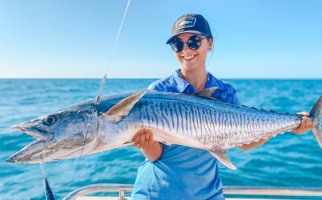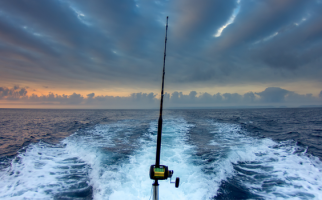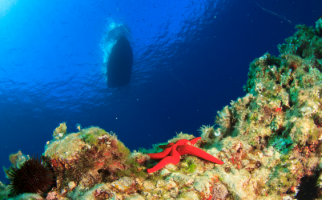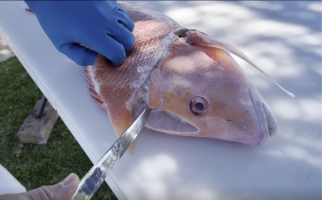All around Western Australia and particularly heading north of Geraldton, a lot of fishers know the frustration of losing prized hooked fish to sharks.
Many of us have experienced the sickening thump on the line, as the rod locks over with the line sizzling off the spool as your would-be catch gets engulfed, leaving just a lifeless head to be reeled in. It’s that or worse still – a clean bite-off with all your rigs going with the ‘tax-man’ as well as your fish.
That’s usually the dinner bell for multiple sharks to gather in the area, meaning getting hooked fish on the boat becomes a frantic race against the chasing pack.
This scenario quickly steals not just hooked fish, but also the enjoyment out of fishing, not to mention is financially painful from lost rigs.

Unfortunately, for fishers who decide to stay in the same spot and carry on battling mother nature’s most adapted marine predator, it is more often than not a losing battle leading to high fish mortality.
Losing high volumes of high value species to shark bite-off is avoidable though.
While sharks might have 400 million years on us regarding perfecting hunting fish in the ocean – there are many experienced fishing experts who have great tips on how to best avoid sharks – and profanity-riddled fishing trips.
Here is some great professional advice on avoiding the ‘men in grey suits’ from Steve Riley – owner of Exmouth Tackle & Camping Supplies and the staff from Tackle World Exmouth.
Keep moving fishing spots
This is the simplest yet most effective tip. It is widely known that once sharks move in on your spot, it’s only going to get worse. “Don’t leave a bite to find a bite,” may be an old fishing adage that holds water – but if you’ve been successful in getting a couple of fish on the boat, it might be worth considering moving spots before the sharks join the party.
It is also worth trolling off to the side of renowned prized fishing spots. The artificial King Reef located east of Exmouth is one spot favoured by many that holds plenty of fish not only on the structure, but 50-100m away from the artificial reef itself. So avoid dropping a line directly on top of the reef as sharks will congregate in more numbers next to the structure. Fishers at the reef also report better catches that are untouched by sharks when fishing adjacent to the structure itself.

Avoid areas known to be shark hot-spots
Don’t waste your time and gear going to a spot you know to have been bad for shark-bite off previously. Sharks are opportunistic feeders and will learn where it’s likely to grab an easy feed. For this reason, it is always a wise idea to fish a fair distance away from boat ramps.
Sharks attuned to the sound of outboard motors have also been observed following boats out from boat ramps.
Consider using shark deterrent devices
Shark deterrents do not stop sharks entering a fishing area, but they do provide more time for anglers to land their fish, which is crucial. DPIRD research suggests the probability of sharks taking fish can be reduced by as much as 65 per cent when using deterrents.
To get the most out of these devices, it is important to rig them properly and position them within one metre of your bait and only have one hook if using a paternoster rig setup. Regardless of using deterrents, the rate of bite-off is highly likely to increase the longer you remain in a fishing spot.
Click on the video below for tips on how to properly rig shark deterrents like Sharkbanz
Turn your sounder and engine off once reaching your fishing spot
Sharks have been known to sense the sonar activity from sounders and a running engine can also bring them in knowing fishers will start dropping a line.
One crucial step to avoiding sharks is stealth. If you are confident in the reliability of your engine, switch it off at each spot along with your sounder. If your engine can be tricky to start, avoid turning it off and simply move spots frequently.

Try putting your reel in free-spool if your fish is being chased by a shark
It is a natural reaction to try and ‘skull drag’ fish into the boat when they are being chased down by attempting to reel it in as quickly as possible. Many fishers think burning the forearms and biceps is the way to go when sharks are lurking, but in reality, you are tipping the odds back in their favour.
Sharks have 20-50m rapid bursts of speed, then fatigue quickly. Let the fish’s endurance work in your favour.
Once your fish is in the clear and also starts experiencing fatigue, chase it down in your boat – then get it in quickly.

Leave the burley bucket and bait at home
Sure, bait and burley work well in attracting the fish to your hook, but those scents are picked up even more acutely by sharks.
Lures, jigs and soft plastics are always better options in avoiding shark bite-off and oily baits such as mulies and burley will rapidly bring sharks into the area. Live-baits will also attract sharks close by.
Avoid catch-and-release fishing
If you have just spent a considerable amount of time pulling a demersal fish to the surface, it will be exhausted and if there are sharks in the area, it is highly unlikely that it will make it back to the bottom without being picked off.
If you want to release a fish and improve its chances of avoiding awaiting jaws, swim the fish alongside the boat a fair distance away from where it was landed until it starts to kick.
Hold your rod and have lures closer to the boat when trolling
As soon as you hook a fish when trolling, you want to react as quickly as possible and create the smallest window of opportunity for sharks.
Keeping a hand on the rod when trolling means anglers can react quicker and prevent the fish taking more line, reducing the fight time. Also, rather than trolling lures 30-50m from the back of your boat, try 15-20m instead as this will not decrease your odds of a hook-up while reducing the distance of the fish to the boat.

Try drifting rather than anchoring
While anchoring up can keep you locked on to your preferred spots, drifting helps you cover more ground and the sound of anchors grabbing on to structure is also known to bring in sharks.
Keep your fishing depths to a minimum
The deeper the water being fished, the more time you spend fighting the fish in order to bring it up to the surface. Try targeting demersals in the shallowest depths possible where they are known to roam.
Catching coral trout in 10-15m of water will always have a better success rate of avoiding sharks than targeting them in depths of 40-50m.

Clean your fish on land rather than at sea
Throwing the discards of your filleted fish back into the waters around your preferred fishing spots will only help accumulate more sharks in that area.
Cleaning your fish on land for composting ensures sharks do not start gathering at popular fishing spots commonly frequented by boats.

Tap into local knowledge
If you are heading out for a fish and want to know where sharks have been highly active, simply pay a visit to your local tackle store and ask for tips. Not only do they know where the best fishing action is occurring, they can help increase your chances of avoiding shark bite-off, ensuring much more enjoyable fishing.
Big thanks to Steve Riley – owner of Exmouth Tackle & Camping Supplies and the staff from Tackle World Exmouth for their tips.